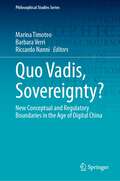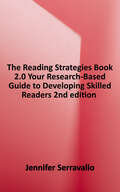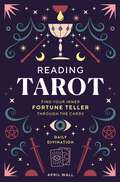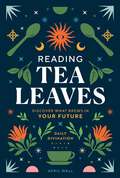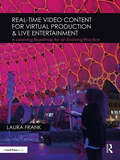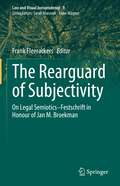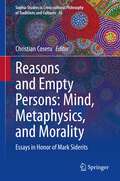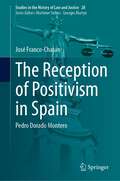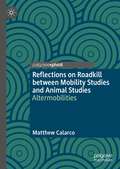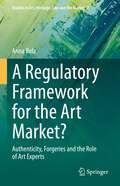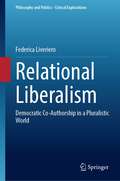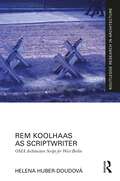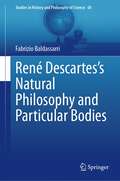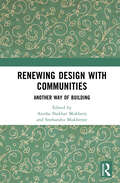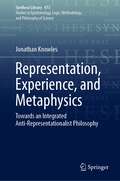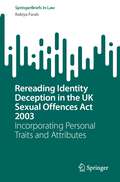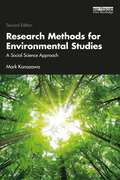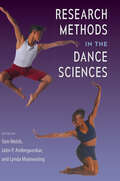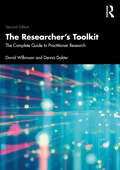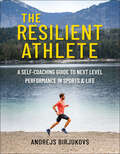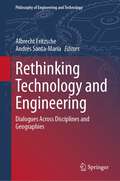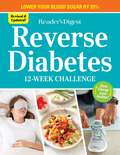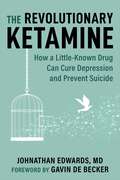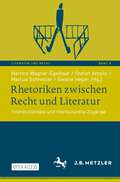- Table View
- List View
Quo Vadis, Sovereignty?: New Conceptual and Regulatory Boundaries in the Age of Digital China (Philosophical Studies Series #154)
by Marina Timoteo Barbara Verri Riccardo NanniThis book presents an interdisciplinary exploration of digital sovereignty in China, which are addressed mainly from political, legal and historical point of views. The text leverages a large number of native Chinese experts among the authors at a time when literature on China’s involvement in internet governance is more widespread in the so-called “West”. Numerous Chinese-language documents have been analysed in the making of this title and furthermore, literature conceptualising digital sovereignty is still limited to journal articles, making this one of the earliest collective attempts at defining this concept in the form of a book. Such characteristics position this text as an innovative academic resource for students, researchers and practitioners in international relations (IR), law, history, media studies and philosophy.
Reading and Writing Math Using Windows Based Applications - WBM (World Bank Modules)
by BookshareThis instructional module focuses on enhancing math literacy among teachers and students with visual impairments through Windows-based applications. It begins by addressing the challenges encountered in accessing mathematical content and outlines the learning objectives for the module. Detailed guidance is provided on utilizing Thorium Reader, a versatile reading app supporting various document formats, with screen readers like NVDA, JAWS, and Narrator to access math content. Moreover, the module extensively covers writing math expressions in Microsoft Word, highlighting keyboard shortcuts, the equation editor, and handwriting features while offering tips and links to additional resources. It delves into an overview of assistive technologies like MathType, MathML, EPUB, LaTeX, and Pandoc for reading and writing math, comparing their advantages and suggesting suitable options based on user profiles and needs. Additionally, it explores the feasibility of reading and writing math in Indian languages, acknowledging limitations and challenges. The page concludes by listing the system and software specifications used for testing the solutions elucidated within the module, ensuring comprehensive coverage of accessibility solutions across multiple platforms and applications.
The Reading Strategies Book 2. 0: Your Research-Based Guide to Developing Skilled Readers
by Jennifer SerravalloEvidence-based, responsive instruction made easier. - 100 new and 200 heavily revised strategies - 700+ references or links to research studies - Skill progressions for progress monitoring - 200 new student-facing charts - New strategies for advanced middle school readers - Recently published mentor texts used in lesson examples Serravallo brings a practical and proven approach to helping teachers help kids develop as skilled readers. The Reading Strategies Book 2.0 is designed to work in every K-8 classroom, providing strategies and lesson plans for every type of reader. The user-friendly design of The Reading Strategies Book 2.0 makes it easy to find strategies, prompts, and tips that meet every student where they are now. Save prep time and support readers' progress toward skills mastery with classroom-ready features such as revised lesson language with updated mentor texts, teaching tips with advice for differentiation, and mostly new student-facing charts. Whether you are looking for powerful and engaging lessons for whole-class teaching, need to supplement your core curriculum with small-group instruction, want to improve the quality of content-area instruction, or need ideas for intervention, The Reading Strategies Book 2.0 will help you connect research to practice.
Reading Tarot: Find Your Inner Fortune Teller Through the Cards
by April WallReading Tarot not only teaches you how to perform tarot readings but also provides clarity on what matters the most in your life. Whether offering insight into relationships and careers paths or providing a sense of calm and clarity for the day, reading tarot cards is an easy way to practice self-care and self-reflection. Professional tarot card reader April Wall provides guidance throughout all aspects of tarot reading and what you can discover about yourself along the way. For years, April has performed tarot readings for clients in search of answers and teaches how to explore your past, present, and future.This beautifully illustrated guide compiles her years of experience to teach you how to accurately interpret 78 major and minor arcana tarot cards and connect your insights to real-life experiences. Complete with numerous examples, traditional card spread types, and tips to apply what you learn in various love, work, and life scenarios, Reading Tarot gives you all the tools you will need to conduct impactful readings on yourself and others. Take hold of your mystical journey and find the answers in the cards! ALL OF YOUR TAROT QUESTIONS ANSWERED: The only tarot guidebook you will ever need! With thorough explanations, a history of the practice, and application tips, this book is the complete package EXPERT GUIDANCE: Written by an expert in metaphysical practice, this book is an authentic and reliable guide to the practice of tarot EASY TO LEARN: With step-by-step instructions and clear explanations, this guidebook is perfect for any skill level PERFECT GIFT: This book makes the perfect gift for any tarot enthusiast in your life COMPLETE THE SERIES: Collect all of the books in the Daily Divination series with Reading Tarot, Reading Tea Leaves, and more!
Reading Tea Leaves: Discover What Brews in Your Future
by April WallReading Tea Leaves: Discover What Brews in Your Future is the perfect resource to master the ancient practice of tea leaf reading, also known as tasseography, and will teach you everything you need to know to learn and interpret the hidden messages that lie in the shapes of the tea leaves. Author April Wall, a spirit-led psychic intuitive, provides an easy explanation to all aspects of the practice and what you can discover about yourself, the future, and the divination power of reading tea leaves. For years, April has performed tea leaf readings for clients in search of answers. This beautifully illustrated guide compiles her years of knowledge and real-life experience to teach you how to confidently interpret over 100 consistent tea leaf patterns and configurations. Complete with a glossary, step-by-step instructions, and insider tips and tricks, Reading Tea Leaves gives you all the tools you will need to perform your very own tea leaf readings. Take hold of your journey and find the answers you have been looking for! 100+ TEA LEAF SYMBOLS EXPLAINED: With over 100 symbols and configurations explained, you will find success in your tea leaf readings every time EASY TO LEARN: This ancient divination practice is made easy with step-by-step instructions that make learning to read tea leaves simple HELPFUL ILLUSTRATIONS: Each tea leaf symbol will be accompanied by an illustration to help readers accurately interpret the symbols PERFECT GIFT: This guide makes a perfect gift for the aspiring psychic or fan of mysticism in your life COMPLETE THE SERIES: Collect all of the books in the Daily Divination series with Reading Tea Leaves, Reading Tarot, and more!
Real-Time Video Content for Virtual Production & Live Entertainment: A Learning Roadmap for an Evolving Practice
by Laura FrankReal-Time Video Content for Virtual Production & Live Entertainment looks at the evolution of current software and hardware, how these tools are used, and how to plan for productions dependent on real-time content. From rock concerts to theatre, live television broadcast to film production, art installations to immersive experiences, the book outlines the various applications of real-time video content – the intersection of gaming and performance that is revolutionizing how films are made and how video content is created for screens. Rather than render out a fixed video file, new tools allow for interactive video content that responds to audience activity, camera position, and performer action in real time. Combining software renderers with environmental information, video content is generated nearly instantaneously to simulate depth, creating a new world of Virtual Production. This book provides an overview of the current software and hardware used to create real-time content while also reviewing the various external technologies the real-time content is dependent upon. Case studies from industry experts appear in each chapter to reinforce the tools described, establish industry practice, and provide insight on a complex and rapidly growing discipline. Real-Time Video Content for Virtual Production & Live Entertainment prepares students and practitioners for a future working with real-time technologies and informs current entertainment technology professionals how to rethink about their old roles using these new tools. The book includes access to a companion website featuring web-based and video resources that expand on topics covered in the text. Each chapter has a unique page that points to example material, video presentations, and professional studies on chapter topics. You can visit the companion website at rtv-book.com.
The Rearguard of Subjectivity: On Legal Semiotics – Festschrift in Honour of Jan M. Broekman (Law and Visual Jurisprudence #9)
by Frank FleerackersEdmund Husserl’s ideas, informed by Kant’s Critiques, constituted a point of departure when rereading philosophical problems of subject and subjectivity. In his “Phänomenologie und Egologie” (1961/63), Jan Broekman revealed how Husserl analysed the “Split Ego” notion in Kant’s vision, which became fundamental for his phenomenology. The form and function of subjectivity were likewise positioned in psychiatry and literature, as well as in aesthetics, as Jan Broekman’s texts on ‘cubism’ demonstrated. Problems of ‘language’ unfolded in studies on topics ranging from the texts of Ezra Pound to the dialogic insights of Martin Buber, all of which were involved in the development of semiotics. Two themes accompanied these insights: the notion and later Parisian mainstream called structuralism, and the urgent need to arrive at deeper insights into the links between Marxism and phenomenology. Central language concepts also played a part: as early as 1986, Jan Broekman published on ‘semiology and medical discourse’, and in 1992 on ‘neurosemiotics’, before addressing the link between speech act and (legal as well as social) freedom in 1993. In all these works, the subject and the atmosphere of subjectivity were essential aspects. In addition to his writing, Jan Broekman gave courses on current philosophical issues, law and medicine until retiring in 1996, and in his “Intertwinements of Law and Medicine” revisited subjectivity aspects, while also offering a synthetic view.In this Festschrift in honour of Jan Broekman, the contributions address the analogue/digital dichotomy in semiotics, the multicultural self in language and semiotics, semiology and legal discourse, the legal subject and the atmosphere of subjectivity, intertwinements of law and medicine, the semiotics of law in legal education, signs in law and legal discourse, making meaning in law, and legal speech acts.
Reasons and Empty Persons: Essays in Honor of Mark Siderits (Sophia Studies in Cross-cultural Philosophy of Traditions and Cultures #36)
by Christian CoseruBest known for his groundbreaking and influential work in Buddhist philosophy, Mark Siderits is the pioneer of “fusion” or “confluence philosophy", a boldly systematic approach to doing philosophy premised on the idea that rational reconstruction of positions in one tradition in light of another can sometimes help address perennial problems and often lead to new and valuable insights. Exemplifying the many virtues of the confluence approach, this collection of essays covers all core areas of Buddhist philosophy, as well as topics and disputes in contemporary Western philosophy relevant to its study. They consider in particular the ways in which questions concerning personal identity figure in debates about agency, cognition, causality, ontological foundations, foundational truths, and moral cultivation. Most of these essays engage Siderits’ work directly, building on his pathbreaking ideas and interpretations. Many deal with issues that have become a common staple in philosophical engagements with traditions outside the West. Their variety and breadth bear testimony to the legacy of Siderits’ impact in shaping the contemporary conversation in Buddhist philosophy and its reverberations in mainstream philosophy, giving readers a clear sense of the remarkable scope of his work.
The Reception of Positivism in Spain: Pedro Dorado Montero (Studies in the History of Law and Justice #28)
by José Franco-ChasánPedro Dorado Montero was one of Spain’s most relevant authors. He contributed to modern Criminal law and Penology with a very unique theory: the Protective Law for Criminals. In a time when neoclassical penal theories and new positivist theories clashed, Dorado Montero’s proposal served as a bridge between the criminal law conceptions of the 19th and 20th centuries.In order to explore his role in the introduction of positivism within Spain and the subsequent success of this trend, this book addresses several aspects. The first three analyzed are his scholarly career, the historical and international context in which he lived, and the various European and other international influences he was exposed to. On this basis, two major points are then discussed.Firstly, Dorado Montero has been traditionally included within the movement known as correccionalismo. However, his legal-philosophical and criminal thought indicates otherwise. It seems to lie closer to positivism than to neoclassical positions. This research aims at challenging the accuracy of the ‘eclectic’ label which traditional historiography has applied to him.In turn, Dorado Montero described a reality in which every moral value and legal representation was a mere product of mankind’s imagination. Man is responsible for the elaboration of morals, law and culture in his own mind. Thus, for him, there were as many moral and legal orders as there were human beings on the planet. Such a claim is polemic even today. Unsurprisingly, the author received criticism from both neoclassical and positivist schools. Thus, the existence of a ‘Doradian positivism’ is explored. Despite the growing interest in these topics over the last few decades, Dorado Montero has somehow been overlooked – even though his Derecho protector de los criminales described the criminal law of the future as well, one that will have to face the new neurological, medical, psychological and genetic challenges of our time.
Reflections on Roadkill between Mobility Studies and Animal Studies: Altermobilities
by Matthew CalarcoRoadkill is a recurrent but often unthought feature of modern life. Yet, consideration of the broader significance of the myriad social, ethical, and political issues related to roadkill has largely gone missing from mainstream scholarship and activism. This neglect persists even in fields such as mobility studies and animal studies that would otherwise seem to have a vested interest in the topic. This book aims to bring roadkill to the foreground of current discussions among scholars and activists in these fields in order to demonstrate that roadkill is a uniquely important site from which to understand and contest the machinations of the dominant social order. It argues that a careful examination of roadkill can help both to uncover the hidden violence of contemporary human-centered systems of mobility and to develop alternative modes of mobility for a renewed social life in common with our more-than-human kin.
A Regulatory Framework for the Art Market?: Authenticity, Forgeries and the Role of Art Experts (Studies in Art, Heritage, Law and the Market #7)
by Anna BolzThis book addresses practical issues in connoisseurship and authentication, as well as the legal implications that arise when an artwork’s authenticity is challenged. In addition, the standards and processes of authentication are critically examined and the legal complications which can inhibit the expression of expert opinions are discussed. The notion of authenticity has always commanded the attention of art market participants and the general art-minded public alike. Coinciding with this, forgery is often considered to be the world’s most glamorous crime, packed with detective stories that are usually astonishing and often bizarre. The research includes findings by economists, sociologists, art historians, lawyers, academics and practitioners, all of which yield insights into the mechanics and peculiarities of the art business and explain why it works so differently from other markets. However, this book will be of interest not only to academics, but to everyone interested in questions of authenticity, forgery and connoisseurship. At the same time, one of its main aims is to advocate best practices in the art market and to stress the importance of cooperation among all disciplines with a stake in it. The results are intended to offer guidance to art market stakeholders, legal practitioners and art historians alike, while also promoting mutual understanding and cooperation.
Relational Liberalism: Democratic Co-Authorship in a Pluralistic World (Philosophy and Politics - Critical Explorations #24)
by Federica LiverieroThis book investigates the unresolved issue of democratic legitimacy in contexts of pervasive disagreement and contributes to this debate by defending a relational version of political liberalism that rests on the ideal of co-authorship. According to this proposal, democratic legitimacy depends upon establishing appropriate interactions among citizens who ought to ascribe to one another the status of putative practical and epistemic authorities. To support this relational reading of political liberalism, the book proposes a revised account of the civic virtue of reasonableness along with an investigation of the epistemic-specific dimension of political equality. By engaging with political epistemology and social theory, this book explores ways to address inherent tensions within the liberal paradigm, using the following strategies of addressing these tensions: first, it defends a twofold model of legitimacy that distinguishes the goals, methodologies, and justificatory tasks of both ideal and nonideal phases of the two-level justificatory framework; second, it contends that democratic legitimacy requires an engaged and contextual critical appraisal of the injustices that characterize our daily social lives, illustrating how structural forms of injustice represent a profound betrayal of the liberal ideal of democratic legitimacy.
Rem Koolhaas as Scriptwriter: OMA Architecture Script for West Berlin (Routledge Research in Architecture)
by Helena Huber-DoudováThis book is the first survey of a new field in architecture theory: script writing. Rem Koolhaas as Scriptwriter explores the intersection of architecture, film, and text using the example of the working method of scriptwriter, Rem Koolhaas, and the Office for Metropolitan Architecture (OMA). This book argues that Koolhaas formulates his approach to architecture on the basis of the “written sketch” or script, and questions its transformations into built environment in the oeuvre of OMA. Divided into two parts, the first part is a theoretical outline that explores the notion of scriptwriting in film. It provides in-depth insights into the definition and historical evolution of the script—as a blueprint, Hollywood script, avant-garde script, storyboard, the relation to auteur theory, and the difference between the script and scenario. It surveys the first original script for the Exodus, of the Voluntary Prisoners of Architecture. The second part offers a unique perspective on the urban development of West Berlin, in which Koolhaas created a metropolitan script, or blueprint, that spans the period 1971–1989, from his first visit to Berlin to the fall of the Berlin Wall. This book will be of interest to researchers and students of architectural theory, urban history, and film studies.
René Descartes’s Natural Philosophy and Particular Bodies (Studies in History and Philosophy of Science #60)
by Fabrizio BaldassarriThis book explores René Descartes’s attempts to describe particular bodies, such as rocks, minerals, metals, plants, and animals, within the mechanistic interpretation of nature of his philosophical program. Despite his early rationalistic epistemology, Descartes’s increasing attention to collections, histories, lists of qualities, and particular bodies results in a puzzling ‘short history of all natural phenomena’ contained in the Principles of philosophy (1644). The present book outlines the role of Descartes's observations and experimentation as he aimed to construct a universal science of nature, ultimately revealing the mechanization of nature in detail, and for curious bodies such as the Bologna Stone or the sensitive herb. What results is a theoretical natural history consistent with the mechanical principles of his philosophy, ultimately shedding new light on his attempt to produce a complete philosophy of nature.
Renewing Design with Communities: Another Way of Building
by Anisha Shekhar Mukherji and Snehanshu MukherjeeThis book looks at alternative ways of analyzing traditional and contemporary architectural design and building practices in South Asia with a special focus on India. It showcases how collaborative projects between architects and local communities and drawing from local building traditions can lead to sustainable and equitable practices in architecture. The volume includes an analysis of projects in rural, tribal, and urban areas of India and Nepal and first-hand accounts of architects, teachers, and professionals engaged in the theory and practice of design and architecture. It examines the differences between the individualistic and the collective approach and explores the meaning of architecture as a process and as a product and as a decentralized, ecologically, and locally sensitive way of designing. While comparing traditional and modern methods of building, it also examines the impact of each method on the community, the economy and the surrounding environment. This book will be of interest to researchers and students of architecture, urban studies, urban planning, urban ecology, urban geography, and sustainable development. It will also be useful for architects, planners, urban designers, and professionals associated with these disciplines.
Representation, Experience, and Metaphysics: Towards an Integrated Anti-Representationalist Philosophy (Synthese Library #473)
by Jonathan KnowlesThis book provides an original perspective on the debate about anti-representationalism and the nature of philosophy. This debate has come to prominence in recent years through the work of people like Richard Rorty, Paul Horwich, Huw Price and Amie Thomasson. It is the first book to explicitly consider this well-known pragmatist kind of anti-representationalism in relation to anti-representationalist views in other areas of philosophy, in particular the philosophy of perception and cognitive science. Taking as its point of departure the neo-pragmatism of Rorty and Price, it critiques the way these (and other) thinkers develop, on this basis, a positive view of philosophy and its remit. By examining the debate about representationalism versus anti-representationalism in perception and cognitive science it provides a different way of understanding the significance of neo-pragmatism, as well as providing an independently interesting perspective on these other debates. A central idea in this perspective involves distinguishing between a world-for-us and a world-in-itself, though in a different way from Kant and many other philosophers. The book extends these reflections to examine questions about realism and the limits of metaphysics for anti-representationalist pragmatism, arguing the view can uphold a common sense kind of realism, as well as the value of distinctively philosophical enquiry in metaphysics.
Rereading Identity Deception in the UK Sexual Offences Act 2003: Incorporating Personal Traits and Attributes (SpringerBriefs in Law)
by Rakiya FarahDoes the Sexual Offences Act (SOA) 2003 provide for consent to be vitiated in all the circumstances we think it should? Can, and should, section 76(2)(b) (the impersonation provision) be read to include a different class of identity deceptions? How should the concept of personal identity be understood in this context?While the concept has had some airing in the courts, and the distinction between identity and attributes of the person softened, the law on rape still fails to give proper effect to identity deception and leaves many questions unanswered. This book offers a novel take on the problem of sexual deception. Through meticulous interrogation of the meaning and normative implications of the concept of personal identity, it challenges the law’s restrictive approach and argues that qualitative identity is, like numerical identity, normatively important. This book provides a comprehensive and nuanced analysis of the philosophical, theoretical, and psychological experimental literature on personal identity, marshalling relevant insights to support a broader reading of the impersonation provision. The argumentative thrust of the book is an extended equivalence thesis, which links numerical with qualitative identity. In this task, it engages in capacious exploration of different kinds of impersonation, at each juncture leading the reader to a more permissive understanding. Guided by the principle of consistency, the central thesis is that certain deceptions about personal traits should be unlawful based on existing prohibitions with which there is equivalence. A central contribution of the book is the articulation of a theoretical framework to support a richer understanding of identity, giving due attention to its qualitative aspects. This new framework is applied at stage three of the equivalence thesis to explain the relationship between individual traits and identity change. By implication, a potentially wide scope of consent-vitiating deceptions is endorsed. This presents a challenge to those who would defend more stringent limits. The book thus invites further discussion on the implications of this approach for the law on rape and indicates areas for further research and attention.
Research Methods for Environmental Studies: A Social Science Approach
by Mark KanazawaThe methodological needs of environmental studies are unique in the breadth of research questions that can be posed, calling for a textbook that covers a broad swath of approaches to conducting research with potentially many different kinds of evidence. Fully updated to address new developments such as the effects of the internet, recent trends in the use of computers, remote sensing, and large data sets, this new edition of Research Methods for Environmental Studies is written specifically for social science-based research into the environment. This revised edition contains new chapters on coding, focus groups, and an extended treatment of hypothesis testing. The textbook covers the best-practice research methods most used to study the environment and its connections to societal and economic activities and objectives. Over five key parts, Kanazawa introduces quantitative and qualitative approaches, mixed methods, and the special requirements of interdisciplinary research, emphasizing that methodological practice should be tailored to the specific needs of the project. Within these parts, detailed coverage is provided on key topics including the identification of a research project, hypothesis testing, spatial analysis, the case study method, ethnographic approaches, discourse analysis, mixed methods, survey and interview techniques, focus groups, and ethical issues in environmental research. Drawing on a variety of extended and updated examples to encourage problem-based learning and fully addressing the challenges associated with interdisciplinary investigation, this book will be an essential resource for students embarking on courses exploring research methods in environmental studies.
Research Methods in the Dance Sciences
by Tom Welsh, Jatin P. Ambegaonkar, and Lynda MainwaringA comprehensive guide to conducting empirical research in dance Research Methods in the Dance Sciences introduces concepts and practices that support effective, empirical research in the dance sciences, including medical science. A valuable new resource for this growing field, this book provides foundational knowledge for anyone who wants to understand, apply, and conduct research with dancers and proposes ways to facilitate more collaboration between the many disciplines that often overlap in this area.In this volume, pioneers of dance medicine and science guide readers through the stages of the research process. They address topics such as choosing a research question, writing a literature review, developing a framework and methodology, influencing the field, and progressing in a research career. Offering dance-specific examples as illustrations, this volume provides clear and instructive strategies for developing a solid repertoire of research skills to examine dance and movement-centered activities. It is ideal for practicing and aspiring dancers, teachers, and clinicians in fields including exercise physiology, motor learning, behavioral sciences, food sciences, medicine, psychology, and somatics who are interested in dance science research.
The Researcher's Toolkit: The Complete Guide to Practitioner Research (Routledge Study Guides)
by David Wilkinson Dennis DokterDesigned for those undertaking research for the first time, this fully updated edition of The Researcher's Toolkit is a practical and accessible guide for all those partaking in small-scale research. Jargon-free and assuming no prior knowledge, it covers the entire research process, from defining a research topic or question through to its completion. This second edition has been fully revised by a collaborating team with a wealth of knowledge and practical experience in research project work. Including activity boxes to highlight key concepts and short summary boxes to indicate fundamental elements of various research areas, the chapters cover: The importance of research and framing your research question and research ethics Practical elements associated with planning and executing your research activity The application of survey-based research methods and the value provided by social media as data collection devices Deploying both quantitative and qualitative tools and techniques to analyse research data Writing up your research work and preparing it for wider access and consumption Examining the effect of your research work through assessing or measuring its impact The Researcher’s Toolkit is a must-read guide for students and budding researchers as well as educators seeking to explain academic research and writing to their pupils. It will benefit anyone looking to complete a research project whether inside academia or beyond.
The Resilient Athlete: A Self-Coaching Guide to Next Level Performance in Sports & Life
by Andrejs BirjukovsThe Resilient Athlete presents a step-by-step self-coaching framework designed to build foundational fitness and develop athletic resilience while optimizing your training for sports, athletics and adventure.The Resilience Athlete presents a series of self-coaching sessions, much like ones people would have with a performance coach. These are not geared towards one particular sport, but rather focus on creating an ultimate athletic experience, one where physical and emotional states are in balance with purpose.Inside the book, readers will discover:Actionable advice to incorporate into one's daily training Strategies to cultivate the mindset to take on challenges and grow in confidence Systems to adopt healthy lifestyle habits to have more energy and feel less stressedThe Resilient Athlete also features training tactics, schedules, and plans to help readers optimize fitness while becoming the very best they can be as an athlete.Online support via social media, community forums, and website featuring additional content such as exclusive exercise videos, nutritional tips, live updates from authors, and more is available.Resilient athletes are made, not born and The Resilient Athlete makes it easy for anyone to learn how to become one. Training for a challenge or goal can be daunting, and the journey fraught with the potential for injury or other setbacks.
Rethinking Technology and Engineering: Dialogues Across Disciplines and Geographies (Philosophy of Engineering and Technology #45)
by Albrecht Fritzsche Andrés Santa-MaríaThis book gives insight into the ongoing work of the forum on Philosophy, Engineering and Technology (fPET), which brings together philosophers and engineers from all over the world to discuss philosophical issues of engineering across disciplinary boundaries. Drawing on presentations and conversations at the fPET 2020 online conference hosted by the Universidad Técnica Federico Santa María in Chile, the chapters establish connections and describe discoveries that have so far been neglected in the discussions held within the young discipline of philosophy of engineering. This volume appeals to students and researchers in the field, through twenty-four proposals brought forward by leading scholars and emerging voices. Pertinent themes covered are:the broader engagement of engineers in problem-solving beyond the scope of their own professionthe exploration of new goals for technology development and the implementation of strategies to reach these goalsthe need for philosophical content and unique pedagogical approaches to engineering education, digital transformations, artificial intelligence and the ethics of online collaboration in social mediacritical revisions of fundamental terminology and theoretical modelling of key concepts in engineering design, ethics, innovation and the anthropology of technology
Reverse Diabetes: How To Shop, Cook, Eat And Live Well With Diabetes
by Reader'S DigestWith the 12-week Eat, Move, Choose plan as a reliable source of guidance and support, readers of this updated and revised edition of Reverse Diabetes will be well on their way to reversing insulin resistance, losing weight, using less medication, and feeling healthier and more energized. Sifting through mountains of conflicting advice about managing diabetes—from friends, family, colleagues, and more—can often be overwhelming and confusing. Reverse Diabetes eliminates the need for guesswork and provides a streamlined, achievable path to better health. The book&’s 12-week Eat, Move, Choose plan is broken down into concrete, manageable goals, including: Walk at least five days a week Include lean protein at every meal Enjoy seven to eight hours of sleep a night Make active choices The goals are supplemented by step-by-step plans, interactive quizzes, infographics, recipes, and other resources that help readers understand the hows and whys behind each recommendation. With science-backed guidance that takes the most current diabetes research into account plus completely new recipes, meal plans, and other tools to make it a breeze to implement, this updated and revised volume offers an easy-to-follow 12-week challenge shown to lower blood sugar by 25 percent. Roughly 40% of the book will be new, and includes new research, new recipes and meal plans, and new planner/tracker tools. Praise for the previous edition: &“This book is great. I learned a lot about good food choices and foods to avoid, also contains great recipes for diabetics that are healthy and delicious. Would recommend this book to anyone with diabetes or pre-diabetes. The section on calories, sugar, and carbohydrates found in different foods was a big help in planning my every day meals. The exercise section was also very helpful. Already lost 15 pounds.&” —J.S MD &“This book answered so many questions when I was newly diagnosed with diabetes. It&’s a long term book for living and reversing diabetes in addition to being very encouraging and upbeat. The organization of the book and the layout are reader friendly. I have marked it liberally with a hi-lighter and refer to it several times a week.&”—Elizabeth Allanson No big scientific words…. Just regular words and pictures :-) it takes you step by step on HOW to improve your life with Diabetes and how to minimize the symptoms and reverse diabetes. GREAT BOOK!&” —S. McGee &“I found this book educational for me. I like the clear descriptions as well as the variety of menus. I am still reading it, but when finished, I will go back to it often.&” —Gisela M. Damandl &“I love this book. I am not diabetic however I did want to shed unwanted pounds. This book teaches how to keep your sugar steady so you aren&’t craving and constantly hungry. An easy read!&” —Shakala &“Excellent book to read if you are diabetic. Many helpful suggestions were presented. Often it just takes a few lifestyle tweaks to make diabetes management possible.&” —Karen L. Pitts &“My husband found out he had type two diabetes and I knew nothing about it or how to cook and care for him. this book was excellant. price and packaging were great as well. recommended purchase&” —mamad &“This is great, explains everything so well. The recipes are great, I do wish there were more but what&’s there is good. This is a great start to YOU helping yourself fight and get rid of diabetes for good. No need for medications, that&’s what you are working for!&” —Nancy J.
The Revolutionary Ketamine: The Safe Drug That Effectively Treats Depression and Prevents Suicide
by Johnathan EdwardsThis isn't a new drug, but it's now being used to treat depression with amazing results. What exactly is it? Is it safe? Is it right for you or your loved one? Suicide captures everyone&’s attention. Suicide is a tragedy usually preceded by plenty of pain. About 1 million go through with the act each year. Imagine if your loved one is determined to end their life, and you could get them help. After reading Revolutionary Ketamine, you will understand: Suicide&’s devastating cost to society and how to prevent it Why children and adolescents are committing suicide How ketamine stops suicide in its tracks Suicide is the stuff of other people&’s nightmares until it happens to someone you love. Time simply stops, leaving you wondering what could have been done. Suicidal ideations hijack our brains, telling us to end our lives prematurely. What if we could remove this hijacking device? Ketamine is the one drug we have today that can safely halt suicidal ideations, yet most have never heard of it. To those who say more studies are needed to know if ketamine helps with suicidal ideations and depression, I offer you this admonition before trying the drug. If you are suffering from depression and suicidal ideations, the risk versus reward is clearly in favor of using ketamine now. Don&’t wait. Dr. Edwards, the author of Revolutionary Ketamine, is committed to helping those who need never become statistics at all and will equip you with the tools to save your loved one&’s life, or possibly your own.
Rhetoriken zwischen Recht und Literatur: Interdisziplinäre und interkulturelle Zugänge (Literatur und Recht #9)
by Martina Wagner-Egelhaaf Stefan Arnold Marcus Schnetter Gesine HegerDie Beiträge dieses Open-Access-Buchs diskutieren das Verständnis von Rhetorik, mit dem heute in Literatur- und Rechtswissenschaft gearbeitet wird. Sie beleuchten, inwiefern sich die westliche Tradition von rhetorischen Perspektiven aus anderen Sprach-, Kultur- und Rechtsräumen unterscheidet. Während die Rhetorik in antiker Tradition in der Literaturtheorie nach wie vor eine große Rolle spielt, hat sie ihren Status als Leitdisziplin in den Rechtswissenschaften eingebüßt und ist lediglich für Teilbereiche wie Argumentationstheorie und Rechtslogik relevant. Der Band nimmt Recht und Literatur in ihrer gemeinsamen sprachlichen Konstitution ernst und fragt nicht zuletzt nach einem geteilten Grundverständnis von Rhetorik.
